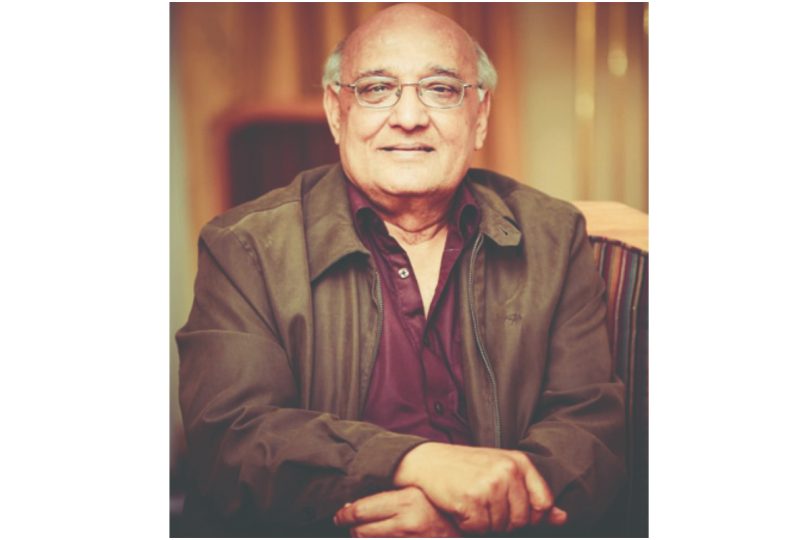Though he is no more with us, the legacy he has left behind will always keep him alive
Some are good playwrights but bad poets; some are bad playwrights but good poets while a few are just moderately okay in both departments without making much of a difference. Amjad Islam Amjad was probably the first person in the entire subcontinent who was at ease whether it be writing a TV drama, a song, or a poem. He preceded many of his successors including renowned Indian scriptwriter and poet Javed Akhtar who once said in a TV interview that plays like Waris made them up their own game as scriptwriters.
Born as Amjad Islam in Lahore on 4th August 1944, Amjad was always into literature and despite his earlier interest in Cricket, he ended up doing his Master’s in Urdu Literature from Punjab University, after which he became a lecturer at the MAO College, where he continued to teach despite achieving fame at a young age. Before his 30th birthday, he was a celebrated poet whose poems graced the pages of Ahmed Nadeem Qasmi’s magazine Fanoos. While many youngsters were busy getting inspired by his work as a poet, he took a strange turn and became a playwright who first started with comedy and later started writing dramas that highlighted the evils of society.
While he used Amjad in his name twice for poetry purposes, he kept it when he turned playwright with one-off TV plays; with Ya Naseeb Clinic he became a TV regular and by the time he penned Waris five years later, he had become a household name. He didn’t let success get to his head and kept churning hit TV dramas, dabbled in a couple of films, and was the national television’s go-to compere when they were in need of a host for an informative program. Since he was well-versed in all topics, he could handle all kinds of programs but was at ease when it was related to literature, history, or dramas.
Amjad’s brilliance can be judged from the fact that he was simultaneously a brilliant playwright, a seasoned poet, a veteran author, and a master of ceremonies, and had no equal in either of the categories. If he penned down superhit plays in the 80s and the 90s, he wrote down a few films, penned over fifty books, and was a regular host on first PTV, and later private TV channels. No mushaira (poetry show) was ever complete on TV without his participation and people who grew up in the era thought of him as a compere who loved to recite poetry instead of the other way around.
Amjad Islam Amjad’s sudden death at the age of 78 is nothing short of a tragedy for the followers of Urdu literature in Pakistan and around the world where he was considered a living legend in his life, and where he will always enjoy the cult status due to his work which will keep him alive forever. Let’s take a look at his individual magnificence as a playwright, poet, author, and host and realize that it will take years to find someone remotely on the same level as the great man.

The Brilliant Playwright
If ever a list is compiled of the best TV dramas ever aired on PTV, Waris will feature among the top three dramas on the list. It was not only the first color drama that tackled society’s evils (ala Shaukat Siddiqui’s Khuda Ki Basti) but also made the audience of the smaller screen realize that they can be treated to a filmi story on TV if told the right way.
During a conversation with the author, Amjad Islam Amjad revealed that when the General Manager of PTV, Lahore Kunwar Aftab approached him for a serious drama, he was known more for his comic scripts, especially Ya Naseeb Clinic which was based on an incident that took place in reality. He was able to rise up to the challenge due to his interest in English fiction where characterization was used to make the readers aware of the evils in the society, rather than showing them the act and that was what he tried to incorporate in Waris.
He also went on to add that at first, he was quite confident that the play he was writing would do well but when it became a massive hit, he was over the moon. He claimed that had he been told 40 years back that Waris would be remembered by the audience after 4 decades he wouldn’t have believed that person.
According to Amjad Islam Amjad, the problem with Urdu dramas before Waris was that they weren’t used to highlight social evils and only people with literary backgrounds had the guts to cross that bridge. He was happy that he was one of the few people who managed to bridge the gap between TV dramas and literature and since the audience was deprived of that, they loved the new kind of play.
If one takes a look back at Waris, the story takes place on many levels simultaneously and every road ends at Chaudhry Hashmat, played by Mehboob Alam. Be his own son who wants his daughter to marry his estranged brother’s son so he can have two stakes in his father’s estate or the angry young man who left his studies to pursue his brother’s killer, whom he hasn’t met, or has no idea how he looks. Add to that the grandsons’ battle for Chaudhry’s affections, the story of a government-sponsored dam, and a hunt for treasure and you have a play that is better than many films, let alone TV dramas.
The play made Amjad Islam Amjad a household name and he went on to pen many different kinds of screenplays. While Samandar and Dehleez were in the Waris mold, there was Waqt, a play on police reforms, Fishaar which spoke about student politics, and many more including Din, Raat, and his final drama in the early 2000s, Sherdil which revolved around the lives of Air Force cadets. Add to that his two successful films Qurbaani and Jo Darr Gaya Wor Marr Gaya and we had someone who could do no wrong. Impressive, isn’t it?
The Seasoned Poet
Long before he became a playwright, Amjad Islam Amjad had made a name for himself as a poet and was a regular feature in Ahmed Nadeem Qasmi’s literary magazine Fanoos. When Amjad Islam Amjad did turn to script writing, those who had read his poetry knew that he was quite special because only someone well versed in the language as well as who understands storytelling could have excelled in both categories and Amjad did that easily. His poetic collection which began with ‘Barzakh’ in the early 70s and ended with ‘Zindagi Ke Meley Main’ five years before his death consisted of more than a dozen books, which is impressive, to say the least.
He didn’t just stop there since he was never content with one-dimensional work and went on to pen ghazals that became popular, as well as lyrics for films in both India and Pakistan. If you didn’t know that Noor Jehan’s evergreen song Main Tere Sang Kaise and Rahat Fateh Ali Khan’s first Bollywood hit Mann Ki Lagan from Pooja Bhatt’s Paap were penned by Amjad Islam Amjad, then you need to read more about him because clearly, you are way behind.
And when Bollywood playback singer Sonu Nigam was selected to sing a couple of songs in Shehzad Rafique’s Salakhein, Amjad Islam Amjad penned the lyrics of both the songs – Naina and Barish – which are still popular after two decades. Not only were his songs for children published in multiple volumes, he also translated poems from other languages notably Arabic, and English, while his own poems were translated into English, Italian, and Turkish!’

The Veteran Author
After conquering two different fields – playwrighting and poetry – it was natural for Amjad Islam Amjad to switch his attention to prose and that’s exactly what he did. Not only did he publish his TV dramas into novels – Waris, Dehleez and Ya Naseeb Clinic were as good as the plays – he also penned travelogues which put him in competition with his friend and contemporary Mustansar Hussain Tarrar. Add to that his criticism of literature, his sketches of people he met, his anthologies especially on women poets, and his column collection, and you have more than fifty books bearing Amjad Islam Amjad’s name doing well in the market.
To venture in so many fields at the same time would have been impossible for normal human beings but Amjad Islam Amjad was always busy doing what he believed he should be doing. With that trademark smile brightening the lives of all those he came in contact with, Amjad Islam Amjad passed away on the same day the Pakistan Literature Festival opened in his birth city Lahore. He was among the speakers in many sessions while a few sessions were supposed to be about him, but his final exit brought curtains down when all his companions were there to bid him farewell.
The man of miscellaneous talents
Before making it big in the entertainment industry, Amjad Islam Amjad was an educationist who didn’t let fame and fortune take him away from what he considered his most important work – teaching. According to those who had seen him mesmerize students in a hall, Amjad was himself when he was amongst young minds and was able to mold them by just psychoanalyzing them, and was against using books in the classroom. That’s why when he was appointed as deputy director of the Punjab Arts Council in 1975 and was later assigned to the Department of Education in the 1990s, he was at his happiest.
He continued to teach at MAO College, Lahore after retiring from government service and held the responsibility as the director of Children’s Complex which is one of the many things he would be remembered. However, with his demise, the TV audience lost a master of ceremonies who was at ease no matter what the subject was. His specialty was literature but if there was a poetry recital being recorded for TV, then there was no other name in anyone’s mind than Amjad Islam Amjad who sort of knew all poets like the back of his hand, was familiar with their work and knew how to control the audience who are usually loud and rough in Mushairas.







